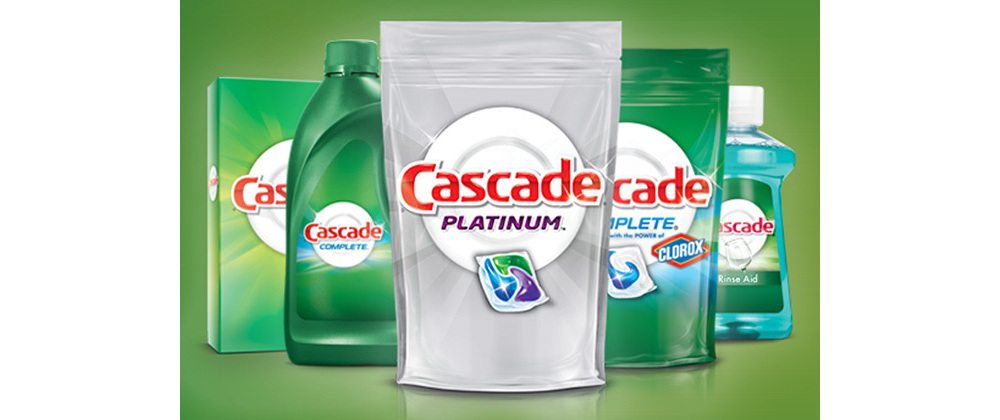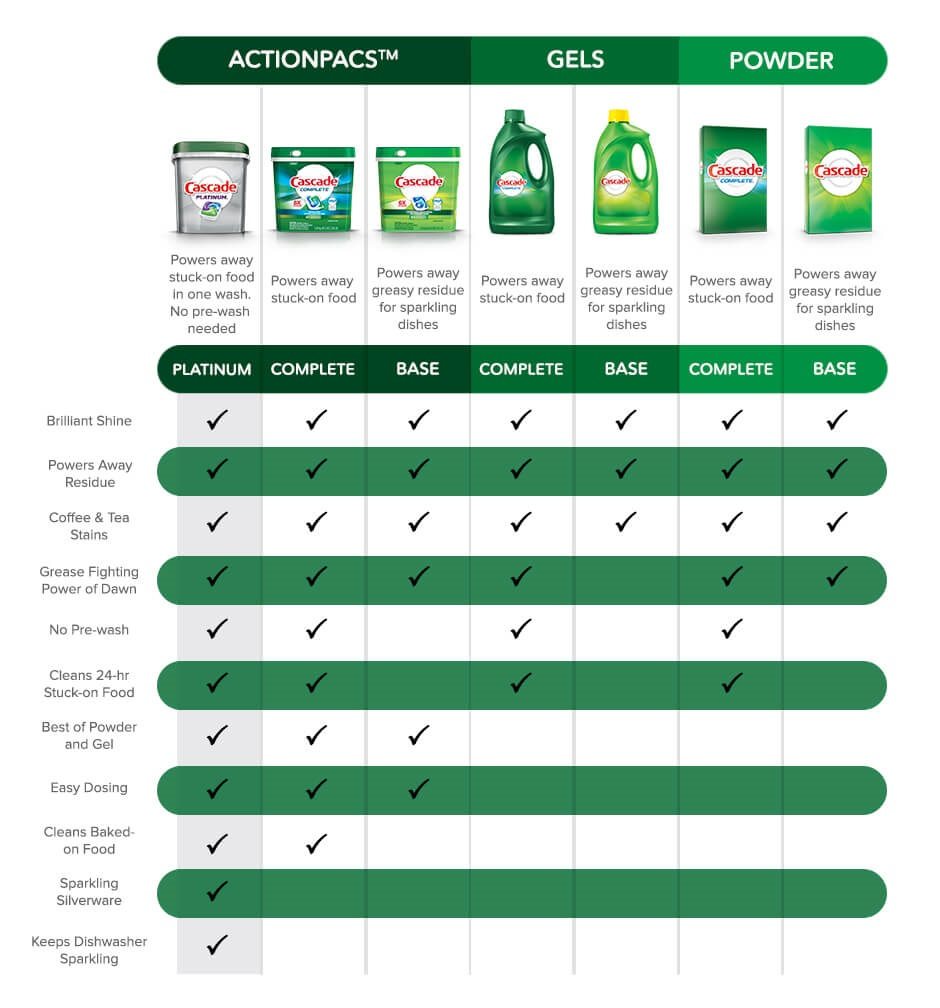
Everyone wants the dishes that come out of their dishwasher to be sparkling clean and free of germs. That’s kind of the point of using a dishwasher. And having them clean the first time saves time, water, money, and effort. Unfortunately, we’ve all had the experience of dishes that didn’t get clean their first time through the machine. Fortunately, Cascade has been working hard for decades to help us have clean dishes without a second wash. Between offering a superior product and developing education on how to get the best performance out of your dishwasher, you can count on Cascade to help you produce the cleanest of dishes.
The History of Cascade
Cascade has been around since 1955. Cascade Liquid hit the scene in 1986. Then in 2003, Cascade ActionPacs were available. Now we have a wide variety of Cascade products to choose from, from the base Cascade products all the way up to Cascade Platinum.

My family has been using Cascade brand dishwashing detergent for as long as I can remember. We used to use the powder, but somewhere along the way we switched to a liquid. The liquid, especially, has worked exceptionally well to clean our dishes. Assuming we pack the dishwasher properly, and the dishwasher itself is clean, everything comes out looking good. (More on that below.)
Dishwashers always have taken less of our time than doing handwashing, but with modern chemistry advances, washing dishes in the dishwasher is becoming a better and better choice. More dishes are becoming dishwasher safe, and detergents, especially Cascade Platinum, are doing a better job cleaning dishes.
How Cascade Cleans
How do dishes get clean? Some factors are local to your individual house and machine options, such as wash time, water temperature, and water hardness. Longer washes, higher temperatures, and lower water hardness all help dishes get clean. But your chosen detergent plays an even bigger part.
To clean dishes in a dishwasher, you need some combination of these factors: alkalinity, chealants, builders, polymers, enzymes, surfactant, and bleach. These can be combined in different ways, resulting in a more or less effective detergent. Each element plays an important role.
Chealant grabs calcium ions, getting them out of the way so the detergent can work properly. Calcium can act as a glue that holds food together, so removing it allows food to break up into tiny pieces. A good chealant also acts as a water softener. No one has a stronger chealant than Cascade (and they have the patents to support that).
Surfactant gathers dirt and grease together and helps wash them down the drain. It also flattens out water spots on dishes, helping it drain off more easily (this is the sheeting action you always hear about on commercials).
Enzymes help break down foods. Cascade has one enzyme that works on starches—such as potatoes and oatmeal—and another for breaking down proteins—such as meat and eggs.
Polymers are great scoopers that sweep away what the chealants have broken down. Polymers also stick to calcium, so it’s important for the chealant to get rid of that.
Bleach works how you would expect. It helps remove stains left behind by coffee and tea, plus works hard on those pesky red stains on plastics. Cascade uses an oxygen bleach which creates a very slow reaction, which works with catalysts that help speed up the process.
You may wonder about phosphates. Many dishwashing detergents used to use phosphates, but as of 2009, Cascade has removed all phosphates from their formulas because it’s bad for the environment.
Since different households have different needs, Cascade offers three tiers of detergent. The main differences among them have to do with how much of each chemistry is in each one, and some of the chemistries are only in certain products. The back of the Cascade containers can give you more details, but here is a handy chart.

Save Water by Using Your Dishwasher
Believe it or not, using your dishwasher saves water over handwashing. In Casade’s studies, they’ve determined that most dishwashers use 4-6 gallons of water per cycle. Handwashing the same amount of dishes can use 20-27 gallons of water. Cascade Platinum helps you skip the sink and the pre-washing (which, itself, can use about 12 gallons of water) by getting your dishes clean in one wash in your dishwasher. Just load the dishes properly and you’re good.
The Cascade Platinum ActionPacs, specifically, provide three times more film-fighting power than a national bargain brand to clean stuck-on foods in the first wash, helping to eliminate the need for pre-washing or any second wash. Cascade Platinum ActionPacs also help prevent hard-water filming, which keeps your dishwasher looking fresh, not to mention cleaning off food, fighting grease, and providing clean rinsing with its built-in rinse aid.
Interactions With Dishes
Many consumers think that dealing with dishes is a straightforward task. You clear the dirty dishes off the table, knock off the big chunks of food into the trash, put the dishes in the dishwasher, run the dishwasher, and then put the dishes away when they are clean. But there is more to it than that. Doing dishes isn’t as straightforward a process as one might think. It turns out that there are many points at which consumers make decisions.
After watching consumers interact with their dishes, Cascade found that a complicated flow chart emerged. Consumers were often sorting their dishes, prepping them in a variety of ways (rinsing, scrubbing, scraping, and sometimes soaking), then loading the dishwasher. But if the dishwasher isn’t full, most people don’t run it yet. When it finally is full, they add a varying amount of dishwashing detergent and run the machine on a variety of cycles. Afterward, they unload, inspect the washed dishes (what passes muster?), and then put dishes away. Phew. Quite the process.
Cascade has also studied different consumer demographics to learn how they interact with their dishes and dishwashers.
Young professionals are early adopters to trends. A lot of newer dishes and cookware are now becoming dishwasher safe, such as Calphalon and LeCreuset. (But aluminum still isn’t dishwasher safe!) There are also remnants of foods that more regularly go through the dishwasher now, such as quinoa and avocado. Young professionals are inventing more new reasons to have dinner parties again, such as dinner clubs or Friendsgiving-type events, creating a lot of dishes at once. At other times, with their smaller households, the dishwasher won’t get run as often, which allows food to dry on the dishes while waiting to be washed. This is when you really need a powerful detergent to get the dishes clean.
For young families, one of the big concerns is finances. Kids are expensive. Saving money on water by using your dishwasher is key. Being able to wash bottles and other baby items in your dishwasher saves a lot of time as well. And the Cascade ActionPacs give a reliable clean, which won’t force busy parents to have to rewash the same dishes again.
For demanding families with older kids, there are a lot of people going to and fro. About 70% of families have kids unloading the dishwasher. Sometimes they also load. If we teach them how to load properly, they’ll know how to properly load them later when they are on their own, where they can continue to save water and effort.
Empty nesters often have the same dishes that they’ve had for decades, sometimes discolored from eating and cooking. Cascade Platinum can help remove stains from tea and coffee, and can even bring copper back to life.
Taking Care of Your Dishwasher
Using the right detergent is only part of the story. You also need to take care of your dishwasher. If your dishwasher isn’t operating correctly, it doesn’t matter what else you do right; your dishes won’t get clean. Here are some steps to keeping your dishwasher in top shape.
- Clean out the bottom of your dishwasher by removing and cleaning any filters, or clean it out manually.
- Make sure the spin arm(s) are clean and their holes are not blocked.
- Use Cascade Machine Cleaner every month or two (run it through without any dishes).
These steps will help your machine working at its best.
Proper Machine Loading
Even if your dishwasher is functioning at its best, your dishes won’t have a good chance of getting clean if it’s not loaded properly. Here are some important tips to keep in mind.
- If there is anything blocking the soap dispenser from opening, that will affect how clean your dishes get, since detergent is the key to a clean load of dishes.
- If anything is blocking the spin arm from spinning, things won’t get very clean. No water, no clean.
- If dishes nest with each other (bowls, spoons, even plates), block each other, or are wedged into small spaces, the water can’t get to all of the surfaces to clean them.
Cascade has made quite a number of videos demonstrating ways to effectively use your dishwasher and to take care of it.
The Cascade website also has a very large FAQ section to address any of your dish-related questions or needs.
This time of year, we’re baking and entertaining more, so our dishwashers are really getting a workout. Make sure you’re taking care of your dishes and dishwasher. You can buy Cascade products, including Cascade Platinum, anywhere dishwashing detergent is sold, including your local grocery and big box stores, and Amazon.
This is a sponsored blog post for which GeekDad was compensated. All thoughts and opinions are my own.




Cascade is toxic sludge that has no place in a healthy home. The brand is notorious for their lack of ingredient transparency. Cascade contains potential allergens, carcinogens, and agents that can be detrimental to the reproductive system.
There are so many companies these days making cleaning products that strive to be safe, healthy, and transparent- Cascade is not one of them.
Nice to say this post was a sponsored post ‘advertising’ at the bottom of the post. Very poor form GeekDad
This crosses the line from sponsored to a dishonest infomercial.
I may end up removing GeekDad from my news feed if these “sponsored posts” continue.
Oh my lord, I actually read a good way in before acknowledging this was a frickin’ ad! Ridiculous. GeekDad just got itself bumped from my news feed.
This is a pretty poor choice. Its not even disguised as something that might be interesting to the readers. Its just a advertisement. I get enough ads in my browsing without things like this. Don’t fall into this hole. Next time, I unsubscribe.
I’m genuinely curious about this statement:
“This is a sponsored blog post for which GeekDad was compensated. All thoughts and opinions are my own.”
How do sponsored posts usually work? The article reads like an ad, but this statement means that it was the GeekDad editor who thought it up and that it reflects her dishwashing opinion?
Hello Alfred. Thanks for reading! What you said is exactly how it works, except that Cascade came to GeekDad and offered an advertising deal. We didn’t necessarily think to write about Cascade on our own.
We are given a chance to try the product, and we (not Cascade) write what we like, and even what we don’t like, about it. If you do a search on sponsored posts on our site, you will find that the ones written by GeekDad and GeekMom are for products that we would use anyway — including our choice of dishwasher detergent. Keep enjoying GeekDad! ~Patricia Vollmer, Senior Editor